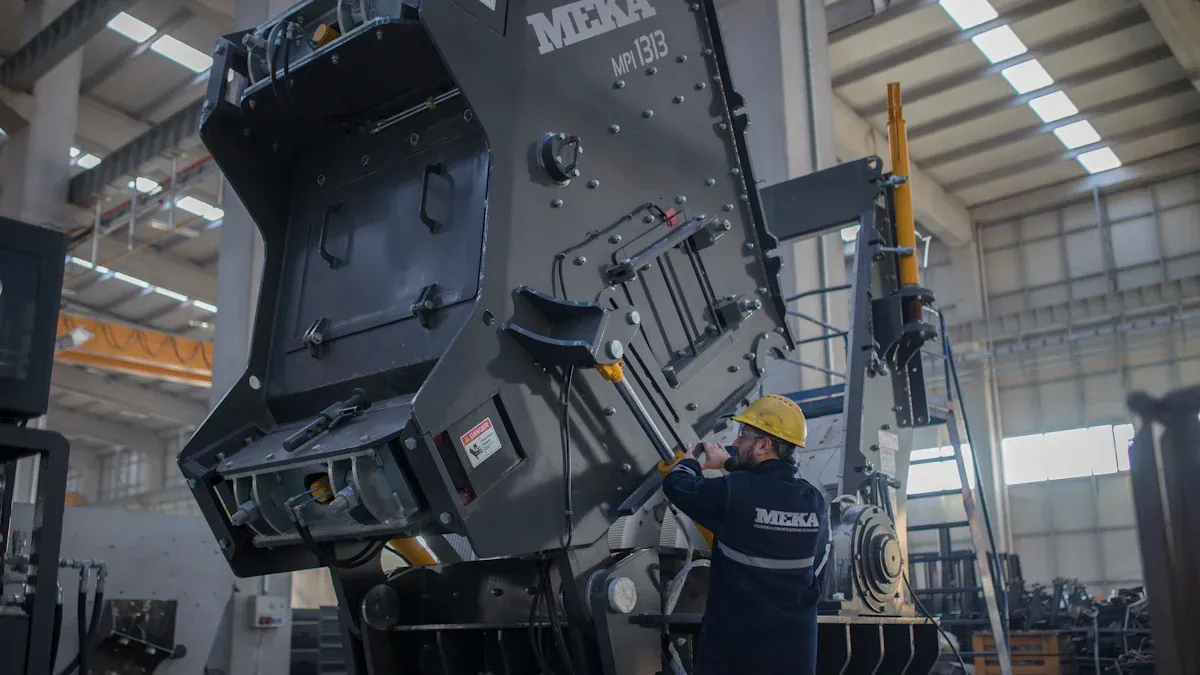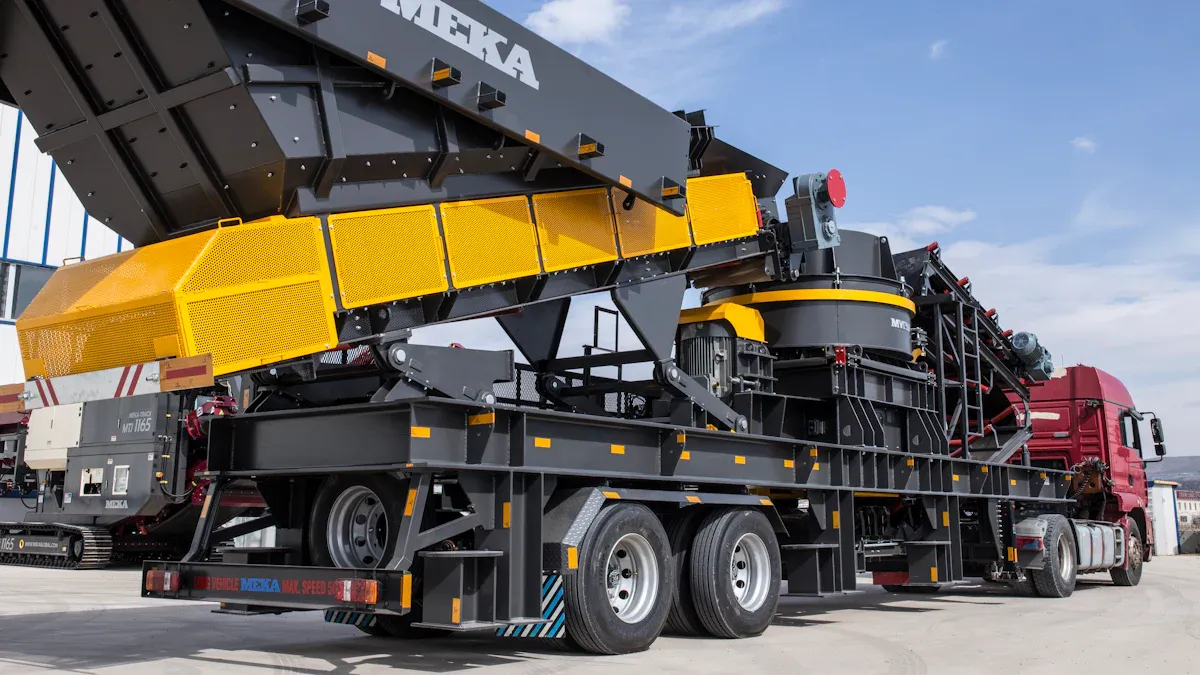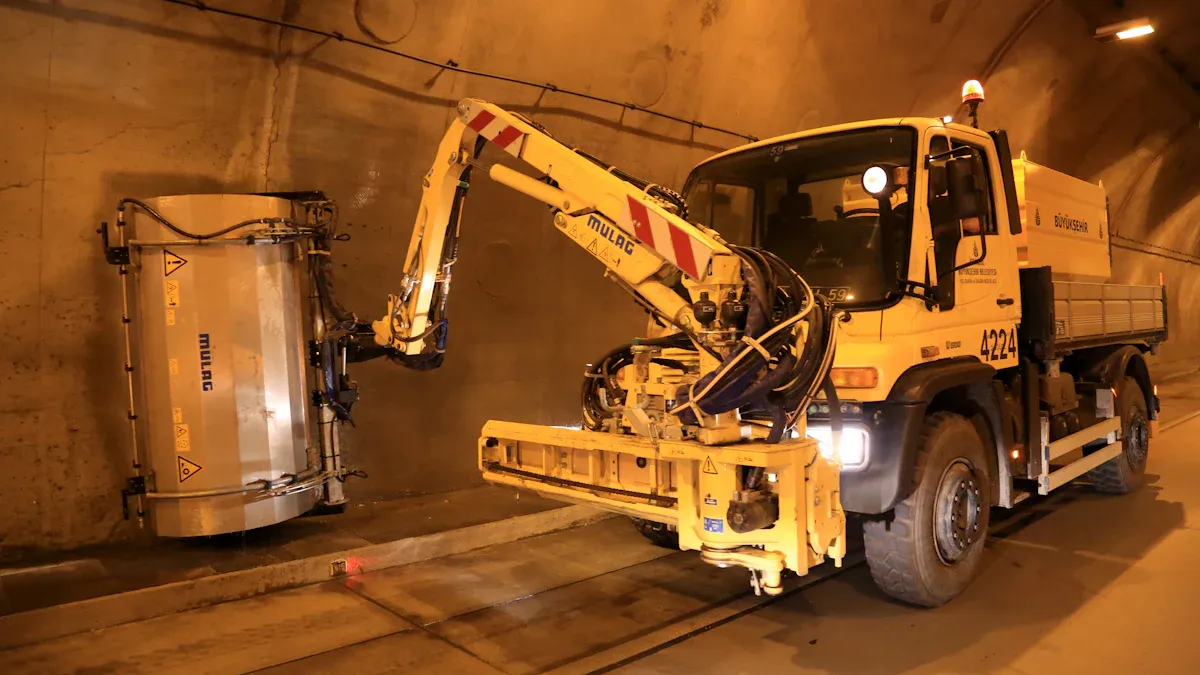
Choosing the right supplier for crusher wear parts can dramatically impact your equipment's performance. For example, at Buenavista del Cobre, optimized wear parts extended the lifespan of concave segments to approximately 13,000 operating hours, reducing downtime and maintenance. Reliable suppliers also enhance efficiency by offering durable materials like manganese steel or TIC insert alloy steel, which last two to three times longer than standard parts. These improvements not only save costs but also prevent frequent replacements, ensuring uninterrupted operations.
A supplier's industry track record reveals their ability to deliver reliable and high-quality crusher wear parts. Reputable suppliers often have years of experience working with various industries, which helps them understand the unique challenges of different applications. For example, many professionals in the mining sector report significant operational improvements when sourcing jaw crusher plates from trusted suppliers. These suppliers not only provide durable parts but also offer guidance on installation and maintenance. This ensures the parts meet strict quality standards and perform efficiently.
The global market for crusher parts is expected to reach USD 12.85 billion by 2027. This growth highlights the importance of partnering with suppliers who have a proven history of delivering quality products on time. Suppliers with a strong track record often collaborate with end users to refine their manufacturing processes, ensuring their parts meet industry demands.
Customer reviews and testimonials are valuable tools for evaluating a supplier's reliability. Positive feedback from existing clients often reflects the supplier's commitment to quality and service. Reviews can provide insights into product performance, customer support, and delivery efficiency. For instance, suppliers who offer tailored solutions and swift logistics services tend to earn higher trust from their clients.
Look for suppliers who are transparent about their material sourcing and compliance with manufacturing standards. This transparency builds confidence in their ability to deliver high-quality crusher wear parts. Additionally, suppliers who provide installation guides and technical assistance demonstrate a commitment to customer satisfaction.
Expertise in manufacturing crusher wear parts is developed over years of experience. Established suppliers understand the complexities of producing durable parts, such as austenitic manganese steel. They often work closely with end users to optimize their products for specific applications.
Specialized inspections, such as 1,000-hour operating checks or annual major inspections, ensure wear parts meet performance expectations. These inspections help identify potential issues early, reducing downtime and maintenance costs. Suppliers with expertise in this field not only deliver quality parts but also provide valuable consultation to enhance equipment performance.

The materials used in crusher wear parts directly affect their performance and lifespan. High-quality materials ensure better resistance to wear and tear, reducing the need for frequent replacements. For example, manganese steel offers excellent toughness and wear resistance, making it ideal for high-impact applications. High-chromium white iron, on the other hand, provides exceptional abrasion resistance, which is perfect for handling abrasive materials. Alloy steels combine hardness and toughness, making them suitable for moderate to high-impact forces.
Here’s a quick comparison of material types and their impact on durability:
| Material Type | Key Properties | Impact on Durability |
|---|---|---|
| Manganese Steel | Excellent toughness, wear resistance, work hardening | Ideal for high-impact applications, longer wear life, reduced downtime |
| High-Chromium White Iron | Exceptional abrasion resistance, contains carbides for enhanced hardness | Suitable for abrasive materials, prolongs service life under sliding wear conditions |
| Alloy Steels | Combination of hardness and toughness | Good wear resistance, withstands moderate to high-impact forces |
Choosing the right material ensures your crusher wear parts perform efficiently and last longer.
Suppliers who comply with industry standards guarantee the reliability of their products. Standards like ISO 9001 ensure that manufacturing processes meet strict quality requirements. When you select a supplier, check if their products adhere to these certifications. Compliance not only ensures safety but also enhances the durability of wear parts. Suppliers who follow these standards often deliver consistent and high-performing products.
Reliable suppliers implement rigorous quality assurance methods to maintain product excellence. These methods include material testing, dimensional inspections, and performance evaluations. For instance, suppliers may conduct hardness tests to ensure the material can withstand extreme conditions. Regular inspections during production help identify defects early, preventing failures in the field. By choosing a supplier with strong quality assurance practices, you can trust that your crusher wear parts will meet your operational needs.

Ensuring compatibility between your equipment and crusher wear parts is crucial for optimal performance. Mismatched parts can lead to inefficiencies, increased wear, and even equipment damage. You should always verify that the wear parts are designed to fit your specific crusher model. Manufacturers often provide detailed specifications, making it easier for you to confirm compatibility. For example, checking the dimensions, material type, and operational requirements ensures the parts will function seamlessly with your equipment. This step minimizes downtime and maximizes productivity.
Customization allows you to tailor crusher wear parts to meet your unique operational needs. Many suppliers offer programs like Chamber Optimization, which designs wear parts based on your specific crushing application and ore properties. These tailored solutions can significantly improve wear life, energy efficiency, and production capacity. For instance:
- Customized parts can reduce energy consumption by up to 30% while maintaining throughput.
- Tailored designs adapt to new operating conditions, ensuring continuous improvement.
- Detailed analysis of your application helps create parts that perform better under specific conditions.
By choosing a supplier that offers customization services, you can achieve better results and reduce overall costs.
Every operation has unique challenges, and your crusher wear parts must address them effectively. Suppliers with expertise in handling special requirements can help you improve production, product sizing, and wear metal utilization. For example:
- IFOR bowl liners have helped hundreds of customers enhance cone crusher performance by handling larger material sizes and maximizing throughput.
- Longer wear part life and lower discard weight contribute to reduced costs and better efficiency.
When selecting wear parts, consider factors like the material being crushed, its characteristics, and your desired output. These considerations ensure the parts meet your specific needs.
Reliable customer support ensures your operations run smoothly, even when unexpected issues arise. Suppliers with responsive support teams can quickly address challenges, minimizing downtime and preventing costly damage. For example:
- A supplier detected a hydraulic leak using predictive analytics before the local system identified it. This early detection allowed the issue to be fixed without additional downtime.
- In another case, a remote service engineer identified a hole in the cloth causing slurry leakage. The supplier communicated this to the customer, preventing premature wear and reducing unplanned downtime.
These examples highlight the importance of suppliers who use advanced tools and proactive communication to resolve problems efficiently. A Western Australian iron ore mine improved its crusher efficiency to 90-98% by partnering with an OEM for audits and optimizations. This demonstrates how responsive support can enhance productivity and reliability.
Clear warranties and return policies protect your investment and provide peace of mind. Most suppliers offer warranties covering a specific period or operating hours. For instance:
| Aspect | Details |
|---|---|
| Warranty Period | One year or 1,000 operating hours, whichever comes first. |
| Coverage | Applies only to the original purchaser and excludes wear components like crusher wear parts. |
| Claim Procedure | Notify the supplier within ten days of discovering an issue. |
| Maintenance Requirements | Adherence to the maintenance schedule is mandatory to maintain warranty coverage. |
Suppliers often require written claims within 30 business days of delivery. Failure to do so may result in acceptance of the product as-is. Understanding these policies ensures you can act promptly if issues arise.
Building a long-term partnership with your supplier offers numerous benefits. A trusted supplier provides reliable and durable products while adapting to your evolving needs. They may also offer training programs to bridge knowledge gaps for new operators and maintenance staff.
Sustainability is another key factor in long-term partnerships. Suppliers committed to sustainability often provide longer-lasting parts, reducing waste and costs. For example, fewer component replacements mean less downtime and fewer worn parts sent to landfills. This approach aligns profitability with environmental responsibility, ensuring your operations remain efficient and sustainable.
When evaluating a supplier, consider their ability to innovate, provide local and global support, and help you achieve your operational goals. A strong partnership ensures your equipment performs optimally while meeting future challenges.
A detailed quote helps you understand the exact cost of crusher wear parts. Reliable suppliers provide clear and itemized quotes, breaking down costs for materials, manufacturing, and delivery. This transparency allows you to compare options and make informed decisions. For example, a supplier might include additional services like customization or technical support in the quote. Always request a comprehensive breakdown to avoid surprises later. A clear quote ensures you know exactly what you are paying for and helps you plan your budget effectiv ely.
Hidden fees can inflate your costs unexpectedly. To avoid this, ask suppliers about any additional charges upfront. These could include shipping fees, taxes, or customization costs. A trustworthy supplier will disclose all potential expenses in advance. You should also review the terms and conditions carefully. For instance, some suppliers might charge extra for expedited delivery or special packaging. By clarifying these details early, you can prevent unexpected expenses and maintain control over your budget.
Balancing cost and quality is essential when selecting crusher wear parts. While lower-cost parts may seem appealing, they often compromise durability and performance. High-quality parts, though more expensive initially, save money in the long run by reducing downtime and maintenance.
Consider these factors when evaluating cost versus quality:
- Research suppliers' reputations and certifications to ensure reliability.
- Weigh the total cost of ownership, including long-term savings from durable parts.
- Understand the trade-offs between upfront costs and operational efficiency.
For example, businesses that invest in high-quality parts often experience fewer breakdowns and longer equipment lifespans. This approach minimizes disruptions and maximizes productivity, making it a cost-effective choice over time.
Selecting the right supplier for crusher wear parts ensures your equipment operates efficiently and reliably. Focus on suppliers with a strong reputation, high-quality materials, and parts that match your equipment. Prioritize those offering responsive customer support and transparent pricing. These strategies help you avoid downtime, reduce costs, and maximize productivity. By applying these principles, you make informed decisions that improve performance and extend the lifespan of your machinery.
You should consider the material's toughness, hardness, and resistance to wear. For high-impact applications, manganese steel works best. For abrasive materials, high-chromium white iron offers better durability. Always match the material to your equipment's operating conditions.
Tip: Consult your supplier for recommendations based on your specific application.
A reputable supplier ensures consistent quality and reliable service. Their experience in the industry helps them understand your needs. Positive reviews and testimonials reflect their ability to deliver durable and efficient parts.
Note: Check for certifications like ISO 9001 to verify their credibility.
Yes, customized parts optimize performance by addressing your unique operational needs. Tailored designs enhance wear life, energy efficiency, and throughput. Customization also ensures compatibility with your equipment, reducing downtime.
Example: Chamber Optimization programs can reduce energy consumption by up to 30%.
Focus on the warranty period, coverage details, and claim procedures. A good warranty protects your investment and ensures peace of mind. Adhering to maintenance sche dules is often required to maintain warranty validity.
Reminder: Notify the supplier immediately if you encounter issues to avoid losing coverage.
Request a detailed quote that includes all potential costs, such as shipping and customization. Review terms and conditions carefully. A transparent supplier will disclose all charges upfront, helping you plan your budget effectively.
Pro Tip: Clarify any additional fees for expedited delivery or special packaging.